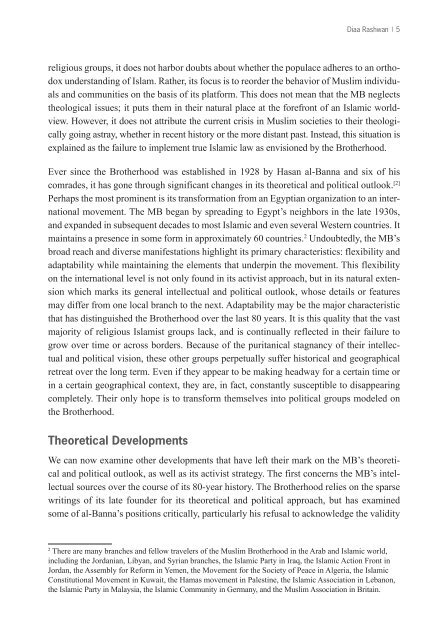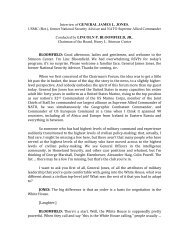Islam and Politics - The Stimson Center
Islam and Politics - The Stimson Center
Islam and Politics - The Stimson Center
You also want an ePaper? Increase the reach of your titles
YUMPU automatically turns print PDFs into web optimized ePapers that Google loves.
Diaa Rashwan | 5<br />
religious groups, it does not harbor doubts about whether the populace adheres to an orthodox<br />
underst<strong>and</strong>ing of <strong>Islam</strong>. Rather, its focus is to reorder the behavior of Muslim individuals<br />
<strong>and</strong> communities on the basis of its platform. This does not mean that the MB neglects<br />
theological issues; it puts them in their natural place at the forefront of an <strong>Islam</strong>ic worldview.<br />
However, it does not attribute the current crisis in Muslim societies to their theologically<br />
going astray, whether in recent history or the more distant past. Instead, this situation is<br />
explained as the failure to implement true <strong>Islam</strong>ic law as envisioned by the Brotherhood.<br />
Ever since the Brotherhood was established in 1928 by Hasan al-Banna <strong>and</strong> six of his<br />
comrades, it has gone through significant changes in its theoretical <strong>and</strong> political outlook. [2]<br />
Perhaps the most prominent is its transformation from an Egyptian organization to an international<br />
movement. <strong>The</strong> MB began by spreading to Egypt’s neighbors in the late 1930s,<br />
<strong>and</strong> exp<strong>and</strong>ed in subsequent decades to most <strong>Islam</strong>ic <strong>and</strong> even several Western countries. It<br />
maintains a presence in some form in approximately 60 countries. 2 Undoubtedly, the MB’s<br />
broad reach <strong>and</strong> diverse manifestations highlight its primary characteristics: flexibility <strong>and</strong><br />
adaptability while maintaining the elements that underpin the movement. This flexibility<br />
on the international level is not only found in its activist approach, but in its natural extension<br />
which marks its general intellectual <strong>and</strong> political outlook, whose details or features<br />
may differ from one local branch to the next. Adaptability may be the major characteristic<br />
that has distinguished the Brotherhood over the last 80 years. It is this quality that the vast<br />
majority of religious <strong>Islam</strong>ist groups lack, <strong>and</strong> is continually reflected in their failure to<br />
grow over time or across borders. Because of the puritanical stagnancy of their intellectual<br />
<strong>and</strong> political vision, these other groups perpetually suffer historical <strong>and</strong> geographical<br />
retreat over the long term. Even if they appear to be making headway for a certain time or<br />
in a certain geographical context, they are, in fact, constantly susceptible to disappearing<br />
completely. <strong>The</strong>ir only hope is to transform themselves into political groups modeled on<br />
the Brotherhood.<br />
<strong>The</strong>oretical Developments<br />
We can now examine other developments that have left their mark on the MB’s theoretical<br />
<strong>and</strong> political outlook, as well as its activist strategy. <strong>The</strong> first concerns the MB’s intellectual<br />
sources over the course of its 80-year history. <strong>The</strong> Brotherhood relies on the sparse<br />
writings of its late founder for its theoretical <strong>and</strong> political approach, but has examined<br />
some of al‐Banna’s positions critically, particularly his refusal to acknowledge the validity<br />
2<br />
<strong>The</strong>re are many branches <strong>and</strong> fellow travelers of the Muslim Brotherhood in the Arab <strong>and</strong> <strong>Islam</strong>ic world,<br />
including the Jordanian, Libyan, <strong>and</strong> Syrian branches, the <strong>Islam</strong>ic Party in Iraq, the <strong>Islam</strong>ic Action Front in<br />
Jordan, the Assembly for Reform in Yemen, the Movement for the Society of Peace in Algeria, the <strong>Islam</strong>ic<br />
Constitutional Movement in Kuwait, the Hamas movement in Palestine, the <strong>Islam</strong>ic Association in Lebanon,<br />
the <strong>Islam</strong>ic Party in Malaysia, the <strong>Islam</strong>ic Community in Germany, <strong>and</strong> the Muslim Association in Britain.

















